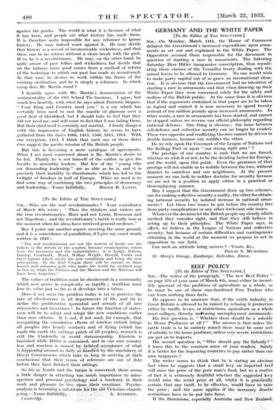GERMANY AND THE WHITE PAPER [To the Editor of THE
SPECTATOR.]
Sta,—On Monday, March . 11th, the House of Commons debated the Government's increased expenditure upon arma- ments as set out and explained in the White Paper. The Opposition accused those responsible for the document in question of starting a race in armaments. The following Saturday Herr Hitler inaugurates conscription, thus repudi- ating those clauses of the Versailles treaty dealing with the armed forces to be allowed to Germany. No one would wish to make party capital out of so grave an international situa- tion. It is obvious that the Government had no intention of starting a race in armaments and that when drawing up their White Paper they were concerned solely for the safety and welfare of the British public. At the same time it is obvious that if the arguments contained in that paper are to be taken as logical and correct it is now necessary to spend twenty instead of ten million pounds upon increased armaments. In other words, a race in armaments has been started, and cannot be stopped unless we reverse our official philosophy regarding national defence. One thing is obvious ; the issue between self-defence and collective security can no longer be evaded.
These two opposite and theories cannot be driven in double harness, because one nullifies the other.
Do we rely upon the Covenant of the League of Nations and the Kellogg Pact or upon " our strong right arm." ?
The prestige of our country is such that we are forced; whether we wish it or not, to be the deciding factor for Europe, and the world, upon this point. Even the greatness Of that prestige will not enable us to wobble between the two, without disaster to ourselves and our neighbours. At the present moment we can look to neither doctrine for security because we arc not in a position to apply either in a practical or thoroughgoing manner.
May I suggest that the Government draw up two schemes, one for making collective security a reality, the other for obtain- ing national security by isolated increase in national arma- ments ? Let these two issues be put before the country free from party complications' or any other irrelevant side issues.
Whatever the decision let the British people say clearly which method they consider right, and that they still believe in acting up to their principles: The White Paper says, in Effect, we believe in the League of Nations and collective security, but because of certain difficulties and contingencies obtaining in the world at the moment we propose to act in opposition to our faith.
Can such an attitude bring success ?—Yours, &e.;




























































 Previous page
Previous page